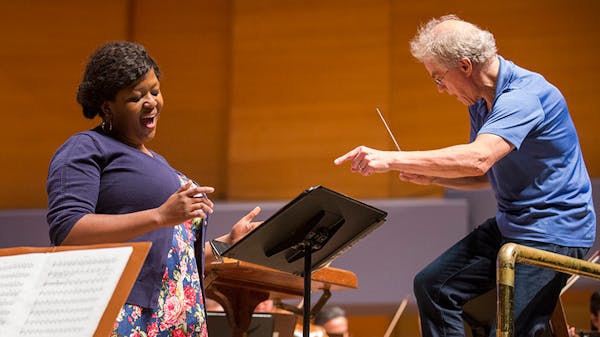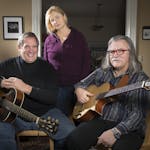Soon, the Minnesota Orchestra will fill an iconic church in Soweto. More than a place of worship, Regina Mundi Catholic Church has been the site of history — a home and organizing hub for those fighting apartheid. But a venue for a symphony concert? That requires constructing a special stage.
"That's the way this band rolls, though," said Michael Gast, the orchestra's principal horn. "We are not averse to risk and challenges. … We're the orchestra that goes where others haven't or won't."
The Minnesota Orchestra flies this week to South Africa, becoming the first U.S. symphony orchestra to tour that country — and maybe the continent. The 11-day, five-city tour echoes the orchestra's groundbreaking trip to Cuba in 2015, where its musicians discovered the power of connecting across cultures through not only concerts but school visits and side-by-side rehearsals.
The tour stems from a confluence of events: The company that handled the journey to Cuba had a long history in South Africa and a dream of bringing a U.S. symphony there. Music director Osmo Vänskä conducted a youth orchestra in Cape Town a few years back, calling it "a turning point in my life." Then, orchestra leaders learned that 2018 would be the centenary of the late Nelson Mandela, the country's first black president.
Months of planning later, some 300 musicians, staffers, donors and choir members are headed to Cape Town.
"And we have discovered over the past year and a half why we are the first U.S. orchestra," Kevin Smith, the orchestra's outgoing CEO and president, told a group gathered at Orchestra Hall for a pre-tour info session. They laughed. "There are a lot of challenges."
'A big dream'
Handling those challenges is Classical Movements, a Virginia-based company that has arranged some 250 concerts in South Africa since 1994. They've also brought dozens of ensembles to the country. Choirs, mostly.
"But it's been a big dream of ours to take a major symphony orchestra," said Neeta Helms, the company's founder and president. The London Philharmonic trekked there decades ago, she noted. The Royal Concertgebouw Orchestra Amsterdam performed in three cities in 2013. But U.S. symphony orchestras haven't gone for a few basic reasons, she said. It's far. It's expensive. And once you're there, audiences aren't guaranteed.
"It's one thing if you go to China, Japan or someplace where there's already these halls and all the infrastructure and some presenter who's going to make money," Helms said. "A country like this which is first world on one hand but also has a range of problems. ... You can't expect that anyone is going to say, in all my priorities, this is something I'm going to support.
"They're only going to support it because you're coming there with the right intentions and you have paid your dues."
The Medtronic Foundation gave $50,000 to the orchestra for its concerts honoring Mandela, one of nine companies backing the tour. But the Minnesota-based medical device company will spend more money — nearly as much as its gift to the orchestra — on a specific aim: attracting diverse audiences.
"We wanted to ensure that at least one third of each of the audiences reflected the beauty of South African diversity," said Jacob Gayle, president of Medtronic Foundation, "both racially, culturally, language-wise and age-wise."
So the company is enlisting its own employees in South Africa and connecting with music organizations to market the concerts, providing tickets and transport, he said.
Classical Movements has made similar connections through years of concerts and commissions, said Helms, who in 2010 married a South African man she met through this work. As soon as the Minnesota Orchestra decided to make the trip, Classical Movements commissioned a work for it. The Minnesota Orchestra premiered "Harmonia Ubuntu," by Cape Town composer Bongani Ndodana-Breen, at a July concert. Over complex, African rhythms, an exulting soprano sings text from Mandela's speeches and writings.
"It's so important to do," Helms said of the commission. "It sort of says, 'I want to come there and not just bring our music — I want your music.' "
A special setting
In the back of Regina Mundi, the Soweto church that was a refuge for black activists during the anti-apartheid movement, Mandela's image is etched in stained glass. The church's walls are pocked with bullet holes.
Ndodana-Breen predicted that the concert there, in the township where Mandela once lived, will be moving, given its history as "the heart, really, of the people's resistance against the apartheid regime."
"I think it's going to be a very emotional moment," said Ndodana-Breen while in Minneapolis for the world premiere of his work. "We are not stoic people in Africa, so there will be a lot of emotions running over. If we recognize the tune the orchestra is playing, our people are going to join in.
He laughed: "I'm warning you right now."
And the audience will recognize the music. Beyond the Ndodana-Breen piece, the orchestra will be teaming up with 50 members of the Minnesota Chorale and the Gauteng Choristers for Beethoven's Ninth Symphony and South African songs. "They're also playing some of the local repertoire," Ndodana-Breen said, "which is so deeply embedded in our choral traditions in South Africa."
The musicians will also be eating, working and playing with South Africans, he noted, including side-by-side rehearsals and master classes with youth orchestras. "That's an extraordinary thing to be a young musician and to be exposed to this level of music-making."
Vänskä conducted the South African National Youth Orchestra in 2014, marking the organization's 50th birthday with Stravinsky's "The Rite of Spring." On this tour, in Pretoria, Vänskä will lead a side-by-side rehearsal with that orchestra, which draws young players from across the country and the continent. "It is a great experience when a young musician can sit next to the professional musician and share these things," he said.
In South Africa, classical music is sometimes seen as being "for white people," he added. "I really would like to see as many black people as members of the youth orchestra."
The whirlwind trip to Cuba, the first by a U.S. orchestra after President Obama relaxed relations with the country, changed the Minnesota Orchestra, Vänskä said. It was the first tour after a contentious, 16-month lockout, "and we had already started to do things a new way," he said, with "more collaborating, more teamwork." Working with young musicians, "sharing this kind of musical experience," cemented those changes. Since then, the orchestra has made side-by-side rehearsals part of every excursion, Vänskä noted, including in Finland.
"When we go somewhere, we don't want to go to play and go home," he said. "We want to leave something there."
Packed in horn player Gast's trunk are gifts he plans to leave behind in South Africa: little pencil holders that clip to a French horn. "Kids see one on my horn," he said, and it's nice to be able to ask: "Would you like one?"
One of the highlights of Gast's time in Cuba occurred in a Havana classroom. The students taught the Minnesota musicians a clave rhythm, integral to Afro-Cuban music, instructing them to clap their hands. "The kids were cracking up about how square we were," Gast said.
And that's the fun part, he said.
"Not only do we get the chance to coach them, they coach us."
Minnesota Orchestra's trip: Reporter Jenna Ross and photojournalist Leila Navidi will cover the tour from South Africa. Follow along at startribune.com/orchestra.
Playing Soweto
On the program: Beethoven's Ninth Symphony, Bongani Ndodana-Breen's "Harmonia Ubuntu" and more music by South African composers, including "Ruri" by Michael Mosoeu Moerane.
Listen: 7 p.m. Aug. 17, Classical MPR 99.5 FM




![John Mayer performed Saturday night. ] AARON LAVINSKY • aaron.lavinsky@startribune.com John Mayer performed Saturday, April 15, 2017 at Xcel En](https://arc.stimg.co/startribunemedia/JV2GTHXCN3AZZ34DQLTEJ67DN4.jpg?w=75&h=75&fit=crop&crop=faces)

